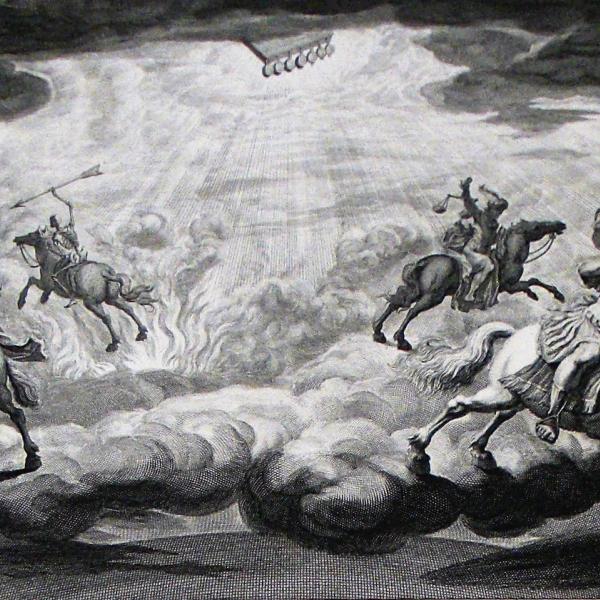How do you remember home? Nancy Berg, a professor of Hebrew and comparative literature, examines this question as it relates to Jewish writers from Iraq. In the mid-twentieth century, the thriving Jewish community in modern-day Baghdad quickly came to an end. Years later, those who experienced life in Baghdad - and also the children of those exiled - turned to literature to share their memories. Berg shares some of these authors and stories and describes the vibrant cultural scene brought to life in these works.
Transcript:
Claire Navarro: Hello, and thanks for listening to Hold That Thought. I’m Claire Navarro. This week on the podcast, our guest is Nancy Berg. Dr. Berg chairs the department of Jewish, Islamic, and Near Eastern Languages and Cultures here at Washington University in St. Louis. She joined Hold That Thought to talk about Baghdad—but a Baghdad quite different from the one we are used to hearing about in the news. One of Berg’s areas of research focuses on Jewish authors who write about their memories of Baghdad—not memories of war, but instead of a thriving Jewish community that existed there until the mid-twentieth century. I personally had no idea how many of these authors were out there. When I went to talk to Berg, there was a huge pile of these books on her desk, and in fact, she might not have discovered the genre either without the help of one particular book of short stories.
Nancy Berg: When I was an undergraduate, I was taking Hebrew and Arabic, and I remember being in a bookstore. They had one book in Arabic, and I bought it even though I couldn’t read it yet. I guess it was a small act of hubris. It was short stories by Iraqi-Jewish Writers.
CN: The book sat on a shelf for years before she was fluent enough in Arabic to actually read it, but then when thinking about topics to research for her dissertation, she remembered it.
NB: I saw the book on my shelf and thought, “Well that’s kind of interesting. There are Jewish writers from Iraq who wrote short stories.” So I looked into it and then discovered the whole world of Iraqi Jewry. That’s kind of how I got started.
CN: Many of these Jewish writers write about Baghdad not simply as place they had happened to once live. There’s a deep sense of connection in these works that comes from tradition and being a part of a deep-seated community and history.
NB: Iraq was host to the most rooted, the most ancient, integrated, and educated Jewish community that dated back to 586 B.C.E. (Before the Common Era).
CN: In many ways the Jewish community in Baghdad was integrated with the rest of Iraqi society. This was especially true starting in the 1920s.
NB: They were active in fields ranging from business to music. Commerce stopped on Saturdays, on the Jewish Sabbath. Something like 98% of the musicians were Jewish, so there were no live broadcasts on Yom Kippur, the day of atonement.
CN: The first finance minister in Iraq was Jewish, the first beauty queen in Iraq was Jewish, and many prominent writers were also Jewish.
NB: The 1940s and 50s were a very exciting time. It was the time of the Iraqi literary renaissance, and the Jews were an integral part in the renaissance. The first short story writer, the first person to write an Iraqi short story, was an Iraqi Jew, Murad Mikhail.
CN: Writers, editors, and publishers from a variety of backgrounds would gather in cafes to discuss art and literature, but sadly this rich cultural scene was short lived. During World War II, many Iraqis had Nazi sympathies, and anti-Semitism was on the rise. In the early 1940s, some 200 members of the Jewish community were murdered in a two-day riot. Ten years later, by 1951, some 124,000 of the 135,000 Jews in Iraq had left, immigrating mainly to Israel. Now living in foreign lands, overtime, Jewish writers created short stories, novels, and memoirs remembering the Baghdad they once knew. There are many examples of these stories. I asked Berg to share just one or two.
NB: One that probably has to be mentioned is the novel Victoria by Sami Michael.
CN: Victoria was first published in 1993 in Hebrew and later translated to English. It’s a large book—some 300 pages long—and includes a huge amount of detail and description.
NB: For me, it was a difficult book to read. It starts out sort of like War and Peace with a huge panorama scene, lots of characters, and not a complicated plot but an interesting approach to the plot.
CN: You might think this type of novel would be more interesting to academics like Berg than the average reader. Even the author himself had doubts about how the book would be received.
NB: When he was writing it, he was thinking, “Who is this going to interest? A book about a poor girl in the early twentieth century, late nineteenth century Baghdad. Who would it possibly interest?”
CN: The answer was lots of people. Lots and lots of people.
NB: It was on the bestseller list for I think 50 out of the 52 weeks of that year that it came out. I was in Israel that year, and I spent a lot of time with the writer and going with him to different meetings that he had with people, fans who had read it. We would go from the equivalent of a YMCA to a community center to another place, and there would be crowds of people who were just so enthusiastic.
CN: Despite Victoria being a long and complicated book, these fans felt intimately connected to the story. Many of the readers had their own memories of Jewish life in Iraq.
NB: It was almost always personal. It was almost always, “This is what my parents talked to me about,” or, “This was the life that I lived,” or, “This is what I knew.” There was just this real thirst and curiosity.
CN: The scenes and emotions in the novel felt real to many of these readers. Berg got to see these emotions first hand for Victoria, but the same is true for many of the books in this genre.
NB: Many of these writers are writing these memoirs in part as a corrective to show a time where even if things were not always wonderful, there was great integration between the different ethnic communities and religious communities. I think those that were involved in that really miss that.
CN: It makes sense that this focus on place and memory would be so strong for writers and readers who lived in Baghdad themselves, who experienced this exile firsthand, but Berg has found that even the children of those who left Iraq feel connected to that time and place. And like their parents, some of these children that connection through writing.
NB: It strikes me that some of these second-generation Iraqi-Jews have taken on their parents’ longings and their parents’ memories, and it comes out in their writing. So much so that some of them even consider themselves exiled from Iraq, from a place that they have never been.
CN: One example is Almog Behar, an author and poet. Behar grew up in Israel, but his mother was from Iraq.
NB: Almog Behar is a great example. He wrote an essay Ana Min Baghdad in which he identifies as an Arab-Jew, and he writes as if his identity is dependent on knowing the Arabic language. He asks in this essay, “Who will hear my longings for the Iraqi homeland in a language that is not Arabic?” That parallels Psalm 137 “By the waters of Babylon,” perhaps the most famous psalm. “How can we sing in a foreign land?” He is trying to figure out, how is he really an Arab-Jew if he has never lived in an Arab land and if he does not speak Arabic.
CN: Behar’s short story includes a description of Baghdad that the reader discovers is not actually real. He’s dreamily describing a city that is based on his mother’s memory, not his own. But what Behar imagines, however, other second-generation writers describe. Driven by curiosity and a sense of heritage, some of these writers have chosen to return to Iraq.
NB: One of them is Marina Benjamin, who appropriates her mother’s nostalgia and had the opportunity—I believe in 2004—to go to Iraq. I was going to say to return to Iraq; that’s the term she uses, and her mother asks, “How can you return if you have never been there?” She goes, and a lot of it is a disappointment. She’s there and thinks how relieved she is that her mother is not with her. The great, mighty Tigris River looks kind of muddy, small, and not very exciting. The place just isn’t what she has pictured from her mother’s memory. The only place she sees Hebrew is in the Jewish cemetery, and that seems to have great meaning and significance. It really is about the death of a community.
CN: Whether based off of first-generation or second-generation experiences, these novels and stories depict a real place in time—in some ways, Berg believes, more real than the versions of the place we find outside of literature.
NB: I’m a little biased, but I think history tries to get at the facts. Reportage gets at the facts. I think literature gets at the truth. There is an emotional truth that is left out of history, journalism, and so forth that is supposed to be left out, and I really do think it is literature’s role to get at that truth.
CN: Truth about family, about memory, and about the meaning of home and place—in this case, Baghdad. Berg herself has not personally been to Baghdad, at least not yet. But like so many others, she has traveled there through the words and memories of writers.
NB: I did have an experience where I was talking to two of the memoirists. We were in Cairo on a boat on the Nile, and it reminded them very much of being on the Tigris in Iraq when they were young. They reverted to the Jewish-Iraqi-Arabic dialect, and you could see the years flake off of them as we were moving down the river. It was almost as if I got to be in Baghdad.
CN: Many thanks to Nancy Berg for joining Hold That Thought. For many more ideas to explore, please visit us at holdthatthought.wustl.edu. You can also find us on Facebook and Twitter or subscribe to our weekly podcasts on iTunes, Stitcher, PRX, or SoundCloud. As always, thanks for listening.
Credits:
Audio Yair Dalal




